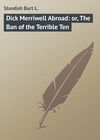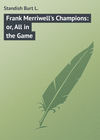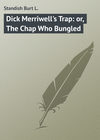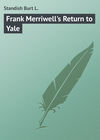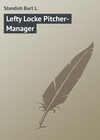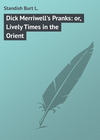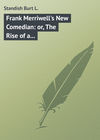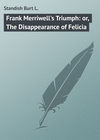Читать книгу: «Dick Merriwell Abroad: or, The Ban of the Terrible Ten»
CHAPTER I. – THE STORY OF QUEEN MARY
“Well, here we are, boys, in Scotland, the land of feuds, of clans, of Wallace, Bruce, Scott, Burns, and of limitless thrilling stories and legends.”
Professor Zenas Gunn was the speaker. With Dick Merriwell and Brad Buckhart, Merriwell’s friend and former roommate at the Fardale Military Academy, as his traveling companions, he had landed at Leith the previous day, having come by steamer from London. The three were now in Edinburgh, strolling down High Street on their way to visit Holyrood Castle.
It was nipping cold. There had been a light fall of snow; but the sun was shining, and the clear air, in strong contrast to the heavy, smoky atmosphere of London, gave them a feeling of lightness and exhilaration.
Perhaps it is not quite true to say it gave them all such a feeling, for there was an expression of disappointment on the face of the boy from Texas, a slight cloud of gloom that nothing seemed to dispel.
The old professor, however, was in high spirits.
“While we’re here, boys,” he said, “we’ll visit as many of the interesting places as possible. Already we have seen Scott’s monument, and to-morrow we will make an excursion to Melrose, and visit Melrose Abbey and Abbotsford. Later on, perhaps, we’ll run over to Loch Lomond and see Rob Roy’s prison and the cottage where Helen MacGregor, Rob Roy’s wife, was born. At Stirling we’ll feast our eyes on the Wallace Monument, which stands on the spot where the great hero defeated England’s army of invasion. Think what it will mean to stand on the field of Bannockburn!
“The English army, my boys, numbered one hundred thousand, while the Scots were less than forty thousand. But Scotland had not forgotten the terrible death of Wallace, who had been captured, carried to London, condemned to die, hanged, cut down while yet alive, to have portions of his body burned, and at last to be decapitated, his head being afterward placed on a pole on London Bridge. The Scottish army of forty thousand was led by the successor and avenger of Wallace, Robert Bruce, who achieved the marvelous object of driving the invaders from the country, fighting on until nowhere did an English foot crush the heather of Scotland.
“Ah! boys, these tales of heroism are the things to stir one’s blood, and make him feel that he might do great, and noble, and heroic things should the opportunity present itself. But in these prosaic, modern times men have little chance to become heroes. Now I feel that I, Zenas Gunn – had I been given the opportunity – might have become a great leader, a great hero, and my name might have lived in history. I’ve always regretted the fact that I was born too late to take part in any of the great struggles for human liberty. I am naturally a fighter. I think that old rascal, Barnaby Gooch, found out that I possessed the courage of a lion and the ability to fight like blazes. When we return to Fardale, boys, he’ll find out something else, I promise you that. Yes, sir, he’ll find out that he’s not the whole thing at that academy.”
“I hope so,” muttered Brad. “I certain hope he’ll get all that’s coming to him.”
“Leave it to me,” nodded Zenas. “I’ll attend to that in due time. In the meantime, boys, we’ll travel and enjoy the things we see while we are educating ourselves at the same time. Ha! there is Holyrood Palace, once the home of that loveliest of women, Mary, Queen of Scots. And there is the chapel in which she was married to Lord Darnley.”
The grim old castle stood before them, its turrets and towers rising against the bleak mountain background in impressive grandeur. There was snow on the mountains, and this made the outlines of the castle stand out sharply and distinctly.
“Stand here a few minutes boys,” invited the old professor. “Before we enter the castle, which will open to admit visitors at eleven o’clock, let’s brush up a little on the romantic and pathetic history of Queen Mary. I’ve always taken the liveliest interest in the story of her career. You know that first she was married to Francis II. and lived in France. After Francis died she returned to Scotland where she was immediately surrounded by a throng of royal suitors. Out of them all she selected that handsome, egotistical, vain, selfish young reprobate, Lord Darnley, which was a frightful mistake, for in a short time he began to treat her with discourtesy and absolute brutality, drinking to excess and behaving in a manner that made him generally detested at court.”
“But I have read that Queen Mary transferred her affection to an Italian musician named Rizzio,” said Dick.
“Hum! haw! Haw! hum!” coughed the professor. “A slander invented by the scheming noblemen about her who wished to rob her of her power in order to advance their own selfish ends. It is doubtful if they made Darnley himself believe it, but they told him it would advance him, and he fell into the trap.”
“But historians say Rizzio was very handsome.”
“Some do, and some say he was very plain and uncomely. It is impossible to tell which story is true; but beyond doubt he was a splendid singer. It was his voice that first attracted Mary. One winter’s day, while at mass, she heard a rich, sonorous voice of great sweetness and power ringing through the aisles. In answer to her inquiries concerning the singer, they told her it was Rizzio, private secretary to the ambassador from Savoy. Mary’s taste in music was of the finest, and she became greatly interested. There is a famous painting by David Neil, which shows the queen standing on the palace steps and regarding Rizzio, who has fallen asleep, mandolin by his side, near at hand. In this picture he is represented as being very handsome; but artists, like poets, take license with facts.”
“Is there any question as to the great friendliness that sprang up between them?” asked Dick.
“Oh, undoubtedly they became friends,” nodded Gunn; “and in this friendship the scheming noblemen who surrounded the queen saw their opportunity. They did their best to arouse the jealousy of Darnley, filling his ears with lies. Darnley was still little more than a boy, and he easily became a tool in the hands of the schemers, who planned to murder Rizzio in Mary’s presence, hoping perhaps that the terrible spectacle and the shock might kill her, which would leave Darnley in apparent power, but really powerless in the hands of the scoundrels who controlled him.”
“Fine business for the countrymen of Wallace and Bruce!” growled Buckhart.
“In those times the nobility seemed very corrupt, in Scotland, as well as other countries. This band of reprobates carried out their bloody plot. They hid in Mary’s bedroom, where they awaited their time. Mary was at supper with three friends in her library. One of the three was Rizzio. In the midst of it Darnley entered the room, took a seat beside the queen, put his arm about her and gave her the kiss of Judas. Then the murderous plotters suddenly appeared in the room, their weapons drawn. Instantly Rizzio started up, his face growing ghastly, for he knew his hour had come. He appealed to Mary, who answered that the king would never permit him to be slain in her presence.
“But Darnley attempted to hold her, and one of the ruffians placed a loaded pistol at her breast, while the others fell on Rizzio. In despair the doomed man caught at Mary’s dress, for he was unarmed and could not make resistance. The assassins slashed at him with their gleaming weapons, and in the struggle the table with its dishes was overturned. Its lights were upset and extinguished, but some of the invaders had brought torches and by the flaring light the bloody work went on. As Rizzio’s clutch on Mary’s dress relaxed she fainted. He was then dragged out into a narrow passage, where he was stabbed until his shrieks became hushed by death. They say the stain of his blood still remains on the oaken floor, and undoubtedly it will be pointed out to us to-day.”
“It’s a great thing, professor, to visit such spots,” said Dick. “I’ll never forget this bit of history after seeing and visiting the castle where it all took place.”
“The finest way in the world to learn history is to visit historic spots,” nodded the old pedagogue. “I suppose you both remember the rest of Mary’s story. The dastardly noblemen made her their prisoner, carrying her to captivity in a grim old castle on Lochleven. She was removed in the night, placed on a horse and compelled to ride at full gallop for several hours. When the castle prison was reached her brutal guards compelled her, under threat of death, to sign an abdication of the throne in favor of her son, at the same time naming one of the plotters, the Earl of Murray, regent, until the boy should come of age. Then she was left there, crushed and heartbroken.”
“But she escaped,” cried Dick.
“Yes, through the assistance of George Douglas, the son of her jailer, who had become so enamored of the sad and beautiful captive that he swore to save her, even though it cost him his life. One Sunday night as the queen sat in her window, gazing out on the placid bosom of the lake, she saw a boat silently approaching. In the boat was Douglas and his younger brother, who contrived to get hold of the castle key while the rest of the Douglas family were at supper. Without delay the daring youths locked the family in and hastened to set Mary free, rowing her across the lake and throwing the keys into the water.
“Mary assembled her followers, who hastened to flock to her support; but in a battle with the army of the regent, the Earl of Murray, she suffered defeat and again became a fugitive. For some time she remained hidden in Dundrennan Abbey, undecided what course to pursue. Some of her friends advised her to flee to France, but she decided to trust to the supposed friendship of her cousin, Elizabeth, Queen of England, and she fled across the English frontier. This was a fatal mistake, for Elizabeth had been her constant foe, fearing her claim to the English throne, and she was again cast into captivity. In the end she was falsely convicted of a conspiracy to assassinate Elizabeth, who was persuaded to sign her death warrant. When she was led to the block her executioners fell on their knees and asked forgiveness for the duty they were compelled to perform, which she freely gave, then entreated the women attending her not to weep, as she was glad to leave the world. Twenty years later her son was sovereign of both England and Scotland; and to-day the bodies of Mary and Elizabeth lie side by side beneath the same cathedral roof.”
CHAPTER II. – THE MEETING AT THE CASTLE
After having the romantic story of Queen Mary thus repeated for them by the old professor, the boys felt a deeper interest in Holyrood Castle as they wandered through its rooms. The guide showed them through the Chapel Royal, which is a beautiful fragment of the ancient abbey, conducted them into the picture gallery and the tapestry apartment, gave them a chance to inspect Lord Darnley’s rooms, and finally brought them to Queen Mary’s apartments, showing where the queen had supped on that fatal night and pointing to dark stains on the floor of the narrow corridor outside, which, in broadest Scotch, he soberly declared “were made wi’ th’ blud o’ Rizzio himsel’.”
Throughout the inspection of the castle Dick was keenly interested, but he noticed that Brad remained gloomy and downcast in appearance.
“What’s the matter, old man?” he finally exclaimed. “Why don’t you brace up and chase that thundercloud off your face?”
“I can’t,” answered the Texan. “I can’t help thinking something wrong has happened.”
“Something wrong? Why, you’re thinking of – ”
“Nadia Budthorne and her brother,” confessed Brad, flushing somewhat. “You know they were to meet us at the hotel in Edinburgh, and they have not done so.”
“Brad, you’ve been smitten on that girl ever since you first saw her on London Bridge. I didn’t think it of you, you husky son of the Lone Star State!”
“Now, don’t try to kid me, pard!” growled Buckhart. “You can’t say much, for if ever a fellow was badly smashed over a girl, you have been smashed over June Arlington.”
“Oh, June and I are just good friends,” Dick hastened to say.
“Good friends, indeed!” mocked the Texan. “Right good friends, and that’s no lie! You were such a mighty good friend to her that you got her sneaking brother back into school after he had been fired, with the result that he put up a low-down job on you that caused you to be expelled. If you try to guy me any at all about Nadia Budthorne you’ll certain hear a few remarks from yours truly concerning June Arlington.”
“Oh, well,” laughed Dick, “I admit you have me there, but how do you know that Nadia cares anything for you?”
“I don’t know,” acknowledged Brad, “and I sure opine that’s what’s keeping me right well fussed up the most of the time. You know you were surprised yourself when we struck Edinburgh, and failed to find the Budthornes at the hotel where they agreed to meet us.”
“They came by rail, and I suppose they have visited Glasgow and other places on their way.”
“Pard, you know that any one who comes from London by rail would naturally visit Edinburgh first. I tell you I have a feeling that something is wrong. We lost track of Miguel Bunol, Heck Marsh, and Luke Durbin right away after the Budthornes left London, and I’m some afraid that onery gang followed Nadia and her brother up here into Scotland. If Bunol could meet Dunbar Budthorne alone, and get a chance to talk with him a few minutes, I reckon he’d get the fellow in his power again, for you must allow, partner, that he exercises some sort of baleful power over Budthorne.”
“I thought it possible we broke Bunol’s spell over Budthorne the night we proved to the latter that Bunol and the others had been fleecing him in a crooked manner at cards.”
“Temporarily we did, I judge; but you know Budthorne’s will power has been some weakened by drink, and he might cave in to Bunol again if the Spaniard found him.”
“I don’t think there is any great cause for worry, Brad. I believe Nadia and her brother will appear in good time.”
During this conversation the old professor had been talking with the guide. He now announced that he was ready to go, and soon the three were leaving by the castle gate.
Just as they passed through the gate they came face to face with two persons who were on the point of entering. They halted in surprise, for they were Hector Marsh and a corpulent, vulgar-appearing man known as Luke Durbin.
A growl of rage came from the throat of Brad Buckhart, and he planted himself in front of Marsh and Durbin, his fists clinched and his whole atmosphere breathing fight.
“Whatever are you two sneaking, onery, low-down coyotes doing here?” he roared, his rugged face dark as a storm cloud.
“My goodness! my goodness!” gasped Zenas Gunn, in great alarm. “Stop him, Richard, or he will attack them! We shall be arrested for making a disgraceful disturbance here!”
Dick caught Brad’s muscular arm in a grip of iron.
“Go slow, old man!” he said, in a low tone.
Neither Marsh nor Durbin acted as if the encounter had given them great surprise. Durbin was smoking a black, rank-smelling cigar, which he rolled into the corner of his mouth, thrusting his pudgy hands deep into his trousers pockets, and surveying the trio before him with an air of insolent contempt.
Marsh exposed his teeth in a sneering grin.
“Why, hello!” he said, in a voice like the croaking of a bullfrog. “So you people are here, eh? What are we doing? Well, I rather guess we have just as good right to visit this old castle as you have.”
“Right,” said Durbin. “And he wants ter be careful about callin’ folks names, or he’ll git his block knocked off. See!”
Dick felt Brad’s arm quiver and the muscles tighten.
“I’d certain enjoy it a heap if either of you varmints would try to knock my block off!” exclaimed the Texan. “I’d enjoy it if you both tried the trick! Just break loose and sail right into me. I’ll stampede over you red-hot and a-whooping, as sure as I’m the Unbranded Maverick of the Rio Pecos!”
“You’re just as big a blower as ever,” said Marsh. “Why don’t you cut out that hot air and learn decency in your talk.”
“Learn decency! Whoop! Would I learn it any of you? Why, you crawling cur, you haven’t one decent bone in your body!”
“Stop him – Dick, do stop him!” gasped the professor. “He’ll get us into a broil!”
Dick’s good judgment told him that it was better to avoid an encounter at that time and place, and, therefore, he spoke a few words to Buckhart, seeking to quiet him.
“That’s right!” cried Marsh. “Better pull him away if you don’t want him hurt.”
“You’ll never harm any one,” said Dick, remembering Hector’s natural cowardice. “I don’t wish him to soil his hands on you, that’s all.”
“If the hot-air merchant wants ter fight,” said Durbin, “why don’t you give him all he’s lookin’ fer, Heck? We’ll jest step aside somewhere an’ you can knock the stuffin’ outer him. I’ll see that his frien’s don’t interfere.”
Marsh turned pale at the thought. He had not the slightest desire to meet Bradley Buckhart in a square fight, man to man.
“Oh, no!” he quickly said. “The fellow talks fight, but it’s all talk.”
“It is, eh?” cried Buckhart, attempting to free himself from Dick’s clutch and stride forward, a furious gleam in his eyes.
Suddenly the bold front Marsh had assumed disappeared. Knowing Merriwell’s disinclination to engage in a personal encounter unless forced to do so, and counting on the pacifying influence of Professor Gunn, the fellow had assumed an air of bravery that was entirely fictitious. Thinking the Texan might get free and come at him, he now dodged behind Durbin, crying:
“Keep your distance! I’ll have the law on you if you touch me! I can prove that we were going about our business when you stopped us.”
Buckhart paused in disgust, muttering:
“I might have known it! I didn’t stop to think what a coward he was at school.”
Durbin showed disappointment.
“Here, what are you dodging for?” he snapped. “You’ve tol’ me fifty times that that fellow was nuttin’ but a bag of wind, and that you could knock the tar outer him in a minute.”
“So I can – if I want to,” said Heck. “But I don’t want – at least, not here. There’s plenty of time. I’ll see him again. I’ll fix him all right.”
“Come along, Brad,” urged Dick. “Here come some other visitors from the castle. Don’t let them see you wasting words on such a worthless and cowardly scamp.”
Professor Gunn also took hold of the Texan and urged him to move away.
“It is the regret of my life,” said the old pedagogue, “that while the fellow was in school I did not sooner learn his true character. I am sorry he was permitted to remain there so long to contaminate other boys.”
“Bah, you old fossil!” croaked Marsh. “You’re an old back-number anyhow, and you’re not fit to teach a monkey school. Why don’t you go die and get yourself buried out of the way! You’d never be missed.”
“Outrageous – outrageous!” gasped Zenas, shaking his cane at the insulting chap. “I’d like to break this stick over your back, you scamp!”
“You never will, old lobster. If you should try it I’d give you a punch in the bread basket that would unhinge you.”
“Are you going to remain here longer and give him further opportunity to insult me, Bradley!” demanded Gunn.
“I’ll go,” said Buckhart, cooling down a little. “Dick is right about him. He is a pitiful coward, and any one who touches him will simply soil his hands.”
As they walked away Marsh continued to shout taunts and insults until they were quite out of hearing.
“Now what do you think about it, partner?” asked Buckhart, as they retraced their way into the city.
“About what?” asked Dick.
“About the possibility that there is something wrong, and that is why Nadia and her brother failed to meet us here. Marsh and Durbin are here, and you can bet your sweet life Bunol is not far away. They followed the Budthornes.”
“It may be that you are right.”
“I’m plumb certain of it. That gang has not given up the hope of again getting hold of Dunbar Budthorne and squeezing money out of him. But what worries me most is the fact that Bunol has an infamous scheme to force Nadia into marriage with him. Just think of it! That sweetest of girls married to a snake like Mig Bunol! It’s enough to make a chap crazy!”
“He’ll never succeed in that, don’t worry, Brad. She knows him, and she despises him quite as much as we do.”
“But they may make her a right good lot of trouble.”
“The fact that those fellows are here in Edinburgh would seem to indicate that the Budthornes must be in the city. Perhaps there was some mistake about the hotel where we are to meet them. We must search for them, Brad.”
“That’s the stuff, pard; we’ll turn this old city over, but we’ll find them.”
“Dear me!” said Professor Gunn. “I hope there will be no serious trouble. I do hope we’ll not get into a fight of any sort with those ruffians.”
“But, professor,” smiled Dick, “a short time ago, as you were recalling the fact that we are in the land of Wallace and Bruce, you said you knew there was good fighting stuff in you and you lamented greatly because you had never been given an opportunity to demonstrate what a hero you really are. It is possible you may have an opportunity while we are in Scotland. Who knows? I seem to scent fighting in the crisp air here.”
“Goodness knows that’s not the sort of fighting I meant! I could shed my blood joyfully for my country, or something like that; but fighting of any other sort is low and degrading and I abhor it – I abhor it.”
Upon arriving at their hotel they found a letter there, addressed to Dick.
“A lady’s writing,” said Merriwell, in surprise. “Who can it be?”
He tore the envelope open. A moment later he uttered an exclamation, calling Brad and the professor to read it. This was all the letter contained:
“Dear Mr. Merriwell: We – my brother and myself – are stopping at Ben Cleuch Inn, which is near Kinross on Lochleven. Left Edinburgh suddenly because I saw Miguel Bunol there, and I believe he had followed us. This will explain why we failed to meet you as agreed. Hope you and your friends may be able to join us at Lochleven. We desire very much to see you again, if only to thank you for all your kindnesses to us. My brother is pretty well, although quite nervous. Your grateful friend,
“Nadia Budthorne.”
On first reading this brief communication Buckhart looked relieved and delighted, but in a few minutes the shadow returned to his face, and it seemed deeper than ever. Dick noted this and questioned him as to the cause of it.
“Oh, nothing,” answered the Texan somewhat gruffly.
“But it is something. I thought you would be pleased to hear from Nadia?”
“I am.”
“You look it!” said Merriwell sarcastically. “Here you have been worrying because she did not meet us, and now that you know where she is you put on a face like a funeral.”
“It’s all right,” muttered Brad, failing to meet his companion’s eye. “It’s all right! I don’t care!”
“What’s all right? What is it you don’t care about?”
“She didn’t have to write to me! She had a right to address the letter to you if she wished.”
Suddenly the truth dawned on Dick; Brad was hurt because Nadia had not addressed the letter to him.
“Well, you’re the limit for silliness!” Dick exclaimed.
“Perhaps I am,” grated Brad. “I can’t help it. I know I’m no prize beauty. I know that beside you I’m a half-finished shine. It’s all right! Of course, all the girls are bound to get struck on you. They can’t help it. But you’ve got girls enough!” he added, in resentful rebellion. “To say nothing of June Arlington, there is Doris Templeton and – ”
Dick put an arm round his friend and laughingly checked him.
“Don’t be such an ass, old man!” he entreated. “Nadia Budthorne is a beautiful girl, but I’m not struck on her, and – ”
“She is on you!”
“I don’t believe it.”
“Then explain some why she sent that letter to you. Why didn’t she address it to me or to the professor?”
“It just happened that way. You know I disguised myself as old Mr. Allsquint and in that manner exposed Bunol and his gang, and I suppose that is why – ”
“Perhaps so,” admitted the Texan suddenly. “I reckon I am an ass, pard! I always was, and it’s becoming more and more natural for me. Of course you can’t be to blame if Nadia took a liking to you. Why shouldn’t she like you more than me? You’re the best chap in the world, and I’m just a very common and a very ordinary chump, without any particular polish and without any pretense to good looks.”
“Brad,” said Dick earnestly, “you are one of the truest, finest, noblest fellows alive. Any one who comes to know you well can’t help liking you; and as for good looks – well, you bear the stamp of a man on your face, and therefore in the very best sense you are handsome. Stop running yourself down. What shall we do? Shall we light out of Edinburgh and make for Kinross and Lochleven to-day?”
“Instanter!” exclaimed the Texan eagerly. “Let’s not lose an hour, pard!”

